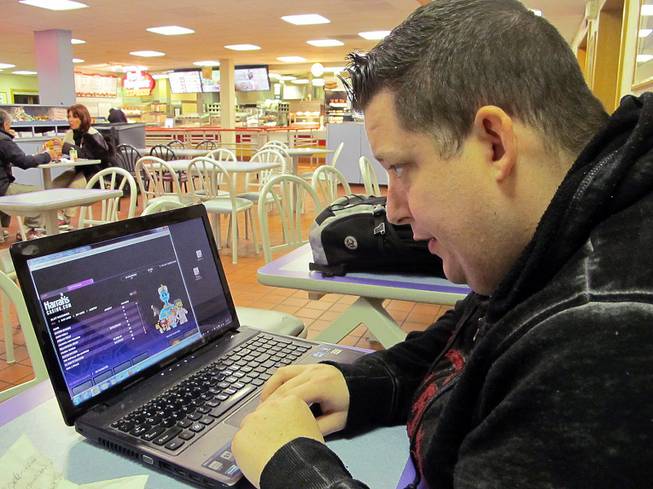
ASSOCIATED PRESS
Joseph Brennen of Ventnor, N.J., logs on to a Harrah’s online casino on his laptop from a highway rest area in Egg Harbor Township, N.J. on Thursday, Nov. 21, 2013, the first day of a test of Internet gambling in New Jersey.
Published Wednesday, Dec. 9, 2015 | 5:12 p.m.
Updated Wednesday, Dec. 9, 2015 | 8 p.m.
Congressional lawmakers took another intense look Wednesday at a controversial bill that would ban online gaming, including in Nevada and the other two states where it is already legal.
The bill was discussed in a House Committee on Oversight and Government Reform hearing that focused largely on the legal and law enforcement aspects of gambling on the Internet. Arguments from the ban’s proponents included that online gaming could not be confidently controlled and was too vulnerable to criminal activity, while ban opponents countered that legal online gambling websites are robustly regulated and actually steer Americans away from shady illegal sites.
The ban legislation, which has been introduced in both chambers of Congress, would roll back a 2011 Department of Justice opinion that paved the way for Nevada, New Jersey and Delaware to implement some form of legal online gaming.
Known as the Restoration of America’s Wire Act, the legislation furthers a goal of Las Vegas Sands Corp. CEO Sheldon Adelson, an outspoken critic of online gaming who has vowed to “spend whatever it takes” to prohibit the activity.
House lawmakers held a previous hearing about the legislation in March.
Republican Rep. Jason Chaffetz of Utah, the House’s lead champion of the ban, said at the beginning of Wednesday’s hearing that online gaming is challenged because “the Internet doesn’t have neat walls around it.”
“For anybody to argue that the Internet can be walled off and used in just these certain boundaries — it’s a joke, come on,” Chaffetz said. “Nobody with a straight face is gonna come before the American people and say, ‘Well, the Internet, it’s just for the people of Nevada,’ or ‘it’s just for the people of Rhode Island.’ You kidding me? You give me a good 18-year-old and about 36 hours and you can hack through just about anything.”
But state Sen. Mark Lipparelli, a former chairman of the Gaming Control Board, said the three states that have legalized online gaming have done well in their regulatory efforts. The Southern Nevada Republican was one of the witnesses who addressed the House committee Wednesday.
“From a regulatory and law enforcement perspective, Nevada, New Jersey and Delaware have been successful,” Lipparelli said. “Where there were concerns over licensing, protecting children and the vulnerable, player protection, taxes, money laundering and geolocation, these states have had good success.”
Rep. Dina Titus, a Las Vegas Democrat, also spoke in support of Nevada’s ability to successfully regulate online gaming. Titus, who is not a member of the oversight committee, invited lawmakers to visit Nevada and “see how this really does work.”
Much of the committee — both Republicans and Democrats — seemed to have strong concerns about the bill. Republican Mick Mulvaney of South Carolina, for example, worried about expanding the role of the federal government. And Democrat Stephen Lynch of Massachusetts feared that banning online gaming would just move it all offshore.
The online gaming ban has also been introduced in the Senate, where two Republican presidential candidates, Sen. Lindsey Graham of South Carolina and Sen. Marco Rubio of Florida, have been among its supporters.
Wednesday’s hearing in the House came two weeks after Nevada’s attorney general, Adam Laxalt, told political journalist Jon Ralston that he would sign a letter in support of the ban.
Laxalt subsequently took heat from Gov. Brian Sandoval for supporting a bill that ran contrary to state law regarding Nevada’s core industry. Later, in a Dec. 7 letter to the leaders of the House and Senate judiciary committees, Laxalt offered some “nuances” in his position, including that he supported Nevada’s regulated industry.
“I am confident in the work of Nevada gaming regulators to ensure the quality of Nevada gaming licensees,” Laxalt wrote.
But he said he was still concerned about unlicensed online gaming and that he agreed with “the spirit” of the ban legislation.

Join the Discussion:
Check this out for a full explanation of our conversion to the LiveFyre commenting system and instructions on how to sign up for an account.
Full comments policy